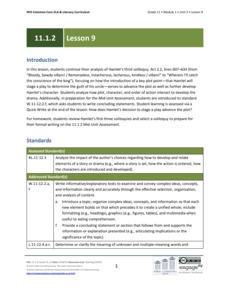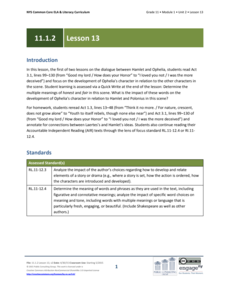EngageNY
Grade 11 ELA Module 1: Unit 2, Lesson 8
How does Shakespeare employ figurative language to emphasize central ideas in Hamlet? Using an interesting resource, learners complete a Quick Write to answer the question. Additionally, they continue their study of the play by exploring...
EngageNY
Grade 11 ELA Module 1: Unit 2, Lesson 7
Following a ghost's advice may not be in anyone's best interest, but that doesn't stop Hamlet! Using an exciting resource, pupils continue reading Act 1 of Shakespeare's Hamlet, in which the ghost tries to convince Hamlet to seek revenge...
EngageNY
Grade 11 ELA Module 1: Unit 2, Lesson 9
Hamlet has an unusual take on the criminal justice system when he decides to determine his uncle's guilt by staging a play. With the resource, scholars continue analyzing Hamlet's third soliloquy from Act 2.2 of Shakespeare's Hamlet....
EngageNY
Grade 11 ELA Module 1: Unit 2, Lesson 13
What impact does word choice have on character development? Using the resource, scholars read Act 3.1 from Shakespeare's Hamlet, focusing on the development of Ophelia's character. They also complete a Quick Write to analyze the meaning...
EngageNY
Grade 9 ELA Module 1: Unit 3, Lesson 10
"O, I am fortune's fool!" As they continue their analysis of Act 3, scene 1, class members consider the role of fate in the events. The lesson concludes with a viewing of a brief portion of Baz Luhrmann’s Romeo + Juliet, in which the...
EngageNY
Grade 9 ELA Module 1: Unit 3, Lesson 14
After watching the scene from Romeo + Juliet in which Juliet argues with her parents because she does not want to marry Paris, groups do a close reading of Act 4, scene 1, lines 44-88, examining the word choices in the conversation...
EngageNY
Grade 9 ELA Module 1: Unit 3, Lesson 16
"Thus, with a kiss, I die." After viewing a film clip of the events leading up to Romeo's suicide, class members analyze Act 5, scene 3, lines 88-120, in which Romeo drinks the apothecary's poison.
EngageNY
Grade 9 ELA Module 1: Unit 3, Lesson 15
Where does Friar Laurence's loyalty lie? After listening to a reading of Act 4, scene 1, lines 89-126 of Romeo and Juliet, groups examine the details of Friar Laurence's plan.
EngageNY
Grade 9 ELA Module 1: Unit 3, Lesson 17
Romeo and Juliet, Act 5, Scene 3, lines 139-170, is the focus of this day's lesson plan. Readers examine the dramatic irony in Juliet's comments and consider how "lamentable chance" caused by a "greater power" plays a role in the tragedy.
EngageNY
Grade 10 ELA Module 4: Unit 2, Lesson 4
Ambition, murder, nontraditional gender roles ... some problems just can't be fixed in marriage counseling. Learners discuss the relationship between Macbeth and Lady Macbeth. As a culminating activity, pupils analyze how the characters'...
PBS
Does Art Imitate Life?
Write what you know, sound advice for any writer and something many famous authors are known to have done. Use these materials to explore how Shakespeare's life influenced his plays. This resource is packed with readings, video segments,...
Literacy Design Collaborative
Whom Do We Trust, and Why?
Is it possible to regain trust? Scholars put much thought into the subject of trust after reading Shakespeare's Macbeth. Readers work together to analyze how the character relationships develop the a message about trust. They then create...
Curated OER
Midsummer Night's Dream Unit
Students use the Internet to research one of Shakespeare's plays. They read two myths and create their own script for the play. They also examine the history of Ancient Greece.
Curated OER
Macbeth Madness
Students analyze Shakespeare's Macbeth in a variety of creative activities. In this Macbeth lesson, students read Act Two, Scene IV and Act Three, Scene I-VI. Students then complete the text given at the link.
Curated OER
Macbeth Madness
Students analyze Shakespeare's Macbeth through the reading and discussion activities. In this Macbeth lesson, students read Act IV and V and then discuss the ending to the play.
Curated OER
Macbeth Madness
Young scholars analyze Shakespeare's Macbeth by completing the creative activities. In this Macbeth lesson, students discuss the timeline for William Shakespeare and identify the characters for Macbeth. Young scholars read Act One,...
Curated OER
Hamlet on the Ramparts: A Pre-reading Activity
Students explore the first act of Hamlet. In this Shakespeare lesson, students pantomime important events from Hamlet in a pre-reading activity. Classmates observe the performances and write reviews.
Curated OER
The 32-Second Macbeth
Students read a very short script synopsis of Macbeth. They read the script, in small groups, trying to break the 32-second record, then write their own 32-second versions of one act from Macbeth.
Curated OER
I Want to Believe: Astrologers and Sceptics in King Lear
Students examine two conflicting writings on solar eclipse that occurred on Black Monday and discuss them in the context of Shakespeare's King Lear. In this Shakespeare instructional activity, students discuss astrology and read the...
Curated OER
When Fair is Foul: Paradox and Equivocation in Macbeth
Students read Macbeth for examples of paradox and equivocation in the text. In this literature-response lesson, students work in groups to analyze Shakespeare's writing for use of paradox using handouts to guide their search. Student...
Curated OER
Introducing the Ghost: Asking Questions and Finding Answers
Students write words that describe the Ghost in Hamlet and act out scenes to grab the audience's attention. In this Hamlet lesson plan, students use language to interpret feeling and grab the audience's attention.
Curated OER
Who's the Fool in King Lear
Students complete close reading and character analysis for Shakespeare's King Lear. In this play analysis lesson, students reenact scene 1, Act 1 and pick only the lines that demonstrate action. Students act out the scene so their body...
Curated OER
Let the Leader Beware
Students consider the tone of Shakespeare's Julius Caesar. In this drama lesson, students read the first two acts of the play and discuss tone of the acts. Students also respond to questions about the characters and their motives.
Curated OER
Claudio and Hero Lesson Plan
Students examine the roles of arranged marriage through their work with Shakespeare's, Much Ado About Nothing. They look at the roles of Claudio and Hero, and determine how their marriage could be considered to be arranged. They complete...

























